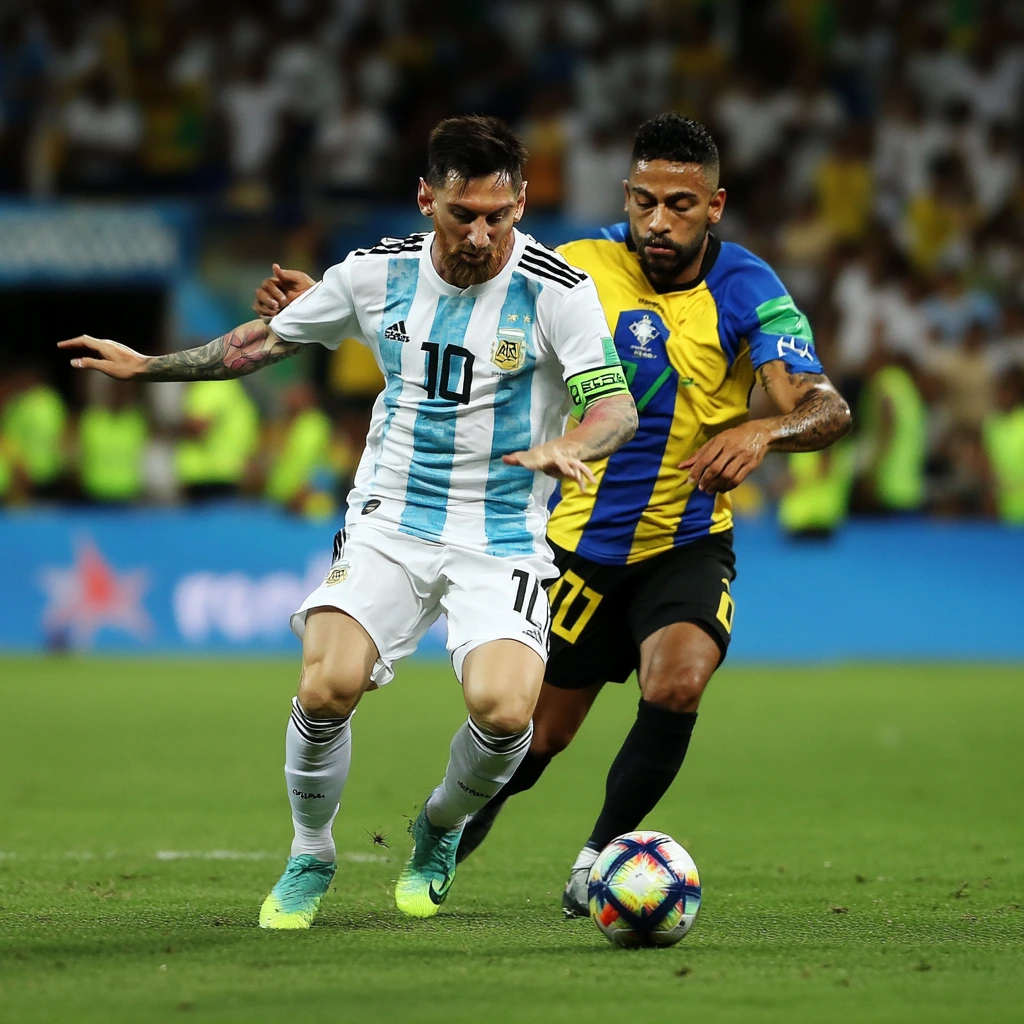Brazil’s national football team is facing turmoil after suffering a devastating 4-1 defeat to Argentina in the World Cup qualifiers. This crushing loss not only deepened concerns about Brazil’s performance but also led to the dismissal of head coach Dorival Júnior. His departure marks another chapter in the team’s ongoing struggles, raising questions about its direction and leadership. With World Cup qualification now at risk, fans and analysts are eager to see how the Brazilian Football Confederation (CBF) will respond and who will step in to lead the Seleção forward
Brazil’s Struggles Under Dorival Júnior
A Short-Lived Tenure with High Expectations
Dorival Júnior was appointed as Brazil’s head coach in early 2024, following the team’s inconsistent performances after the 2022 FIFA World Cup. His arrival was seen as a chance for stability, especially after Brazil went through multiple coaching changes. However, from the start, his leadership faced skepticism, with many questioning whether he was the right fit to restore Brazil’s dominance on the international stage.
Disappointing Results and Tactical Issues
Under Dorival’s management, Brazil struggled to find consistency. The team won just 7 out of 16 matches, with several lackluster performances in both friendly matches and competitive fixtures. Brazil’s attack often looked disorganized, and the defense failed to maintain composure under pressure. Some of the key issues included:
- A lack of tactical identity, with the team frequently shifting formations.
- Difficulty in breaking down defensive opponents, leading to a lack of goals.
- Defensive errors, which resulted in costly defeats against top teams.
Copa América and World Cup Qualifying Setbacks
One of the biggest disappointments during Dorival’s tenure was Brazil’s early elimination from the Copa América. The tournament was expected to be a proving ground for the team, but instead, it highlighted Brazil’s weaknesses. Additionally, the World Cup qualifiers have been a struggle, with Brazil now in an uncertain position in the CONMEBOL standings.
Mounting Pressure and Fan Backlash
As losses and poor performances piled up, pressure mounted on Dorival Júnior. Fans and pundits heavily criticized his squad selections, lack of tactical discipline, and inability to inspire the players. The humiliating 4-1 defeat to Argentina became the tipping point, forcing the Brazilian Football Confederation (CBF) to take action and relieve him of his duties.

The Crushing 4-1 Defeat Against Argentina
A Match That Shocked Brazilian Football
Brazil’s 4-1 loss to Argentina in the World Cup qualifiers was more than just a defeat—it was a statement about the team’s ongoing struggles. The match, played at the iconic Estadio Monumental in Buenos Aires, exposed Brazil’s defensive frailties, lack of cohesion, and inability to handle high-pressure games. For Brazilian fans, the result was both humiliating and alarming, raising serious concerns about the future of the national team.
Key Moments That Defined the Game
Argentina dominated from the start, quickly taking control of possession and dictating the tempo. Here’s how the goals unfolded:
- Julián Álvarez (Argentina) opened the scoring, capitalizing on Brazil’s defensive lapse.
- Enzo Fernández doubled the lead, showcasing Argentina’s clinical finishing.
- Alexis Mac Allister added a third, exposing gaps in Brazil’s defensive setup.
- Giuliano Simeone sealed the win with a fourth goal, leaving Brazil with no chance of a comeback.
- Brazil’s lone goal came from a late consolation strike, but it did little to change the mood of the match.
Brazil’s Defensive Collapse and Tactical Issues
One of the biggest takeaways from the game was Brazil’s defensive instability. Poor positioning, slow reactions, and lack of communication at the back allowed Argentina to break through with ease. Midfield control was another major issue, as Brazil struggled to keep up with Argentina’s high-intensity pressing and quick passing.
Dorival Júnior’s tactical decisions also came under scrutiny. His choice of formation and substitutions failed to make an impact, further frustrating fans who expected a stronger response from the team.
What This Defeat Means for Brazil
This loss not only widened the gap between Brazil and Argentina in CONMEBOL standings but also put Brazil’s automatic World Cup qualification at risk. With confidence at an all-time low, the team now faces an uphill battle to regain form and rebuild under a new coach. The pressure is on the Brazilian Football Confederation (CBF) to make the right managerial decision and steer the Seleção back on track.

Brazil’s Coaching Crisis: What Went Wrong?
Constant Managerial Changes Since the 2022 World Cup
Since Brazil’s disappointing quarterfinal exit in the 2022 FIFA World Cup, the national team has struggled to find stability in its coaching staff. Following Tite’s departure, Brazil has gone through multiple head coaches, each failing to deliver the expected results. The lack of consistency in leadership has prevented the team from developing a clear tactical identity, leading to confusion on the field.
Some of the key coaching changes include:
- Tite (2016–2022): Stepped down after Brazil’s World Cup exit.
- Ramon Menezes (2023, interim): Failed to impress in his short stint.
- Fernando Diniz (2023–2024): Struggled with tactics before leaving.
- Dorival Júnior (2024–2025): Couldn’t turn things around and was dismissed after the Argentina defeat.
The frequent changes have created uncertainty among players, who have had to adjust to different playing styles, formations, and strategies with every new coach.
Tactical Instability and Poor Squad Selection
One of the biggest criticisms of Dorival Júnior and his predecessors was the lack of a defined playing system. Unlike past Brazilian teams known for their attacking flair and creative football, the current squad has lacked rhythm and cohesion.
Some of the key tactical issues included:
- Frequent formation changes, leading to a lack of team chemistry.
- Poor squad selections, with key players left out or played out of position.
- Defensive vulnerabilities, allowing too many easy goals.
- Lack of attacking creativity, making Brazil look predictable.
Growing Fan and Media Frustration
Brazilian football fans are some of the most passionate in the world, and they have not held back in their criticism of the national team’s performance. The 4-1 loss to Argentina was a breaking point, with fans demanding immediate changes. Brazilian media has also been relentless, questioning the leadership of the Brazilian Football Confederation (CBF) and calling for a stronger, long-term plan for the team’s future.
Pressure on the Brazilian Football Confederation (CBF)
With the team struggling and World Cup qualification now in danger, the CBF faces enormous pressure to find a suitable replacement for Dorival Júnior. Their next appointment must bring stability, tactical discipline, and a return to Brazil’s traditional attacking football. Anything less could spell further disaster for the Seleção.

Possible Replacements for Dorival Júnior
Carlo Ancelotti: The Ideal Candidate?
One of the most talked-about potential replacements for Dorival Júnior is Carlo Ancelotti, the experienced Italian coach currently managing Real Madrid. Ancelotti has a track record of success at the highest levels, having won multiple league titles, Champions League trophies, and domestic cups. His calm demeanor, tactical flexibility, and ability to manage top-tier talent have earned him widespread respect in the football world.
Why Ancelotti?
- Experience at the Highest Level: Ancelotti has managed some of the biggest clubs in Europe, including Milan, Chelsea, and Paris Saint-Germain, as well as Real Madrid. His vast experience in international tournaments makes him a strong candidate for Brazil’s national team.
- Tactical Acumen: Known for his tactical adaptability, Ancelotti has coached teams that play both possession-based football and counter-attacking styles. This flexibility could benefit Brazil as they seek a more balanced and effective approach.
- Possible Hurdles: Ancelotti’s contract with Real Madrid runs until 2026, making an immediate move to Brazil highly unlikely. While the CBF would love to bring him on board, the timing and compensation required to release him from his contract could present major obstacles.
Jorge Jesus: A Strong Contender
Another leading name in the mix is Jorge Jesus, the Portuguese coach who has had a highly successful run with several clubs, including Flamengo and Al Hilal. Jesus is known for his attacking football, aggressive tactics, and ability to work wonders with limited resources—qualities that could help revive Brazil’s national team.
Why Jorge Jesus?
- Proven Success with Flamengo: Jesus led Flamengo to one of its most successful periods, winning the Copa Libertadores and Brazilian Serie A titles. His ability to maximize player potential could be exactly what Brazil needs to reclaim its status as a football powerhouse.
- Understanding of South American Football: Having coached in Brazil, Jesus understands the competitive nature of South American football and the unique dynamics of the region’s top teams. This familiarity could help him integrate seamlessly into Brazil’s setup.
- The Drawbacks: While Jesus has enjoyed success in South America and the Middle East, critics argue that his approach may be too aggressive and risky for a national team that needs both stability and pragmatism. His coaching style could be a gamble for a team that needs to recover quickly from setbacks.
Other Potential Candidates:
Aside from Ancelotti and Jorge Jesus, several other names are being discussed within Brazilian football circles:
- Luis Enrique: The former Spain head coach is known for his high-pressing, possession-based style. He would bring a modern tactical approach to Brazil, but his preference for playing young, dynamic players might not align with the current squad.
- Tite (Possible Return): While his tenure was ultimately disappointing due to the World Cup exit, Tite’s understanding of Brazil’s top players and his ability to handle the pressure of managing the national team make him a potential candidate for a return in case of further struggles.
- Fernando Diniz: The former interim coach and current manager of Fluminense could be considered for his commitment to attacking football, though his lack of experience on the international stage could work against him.
The Importance of Stability and Long-Term Planning
Whoever takes over as Brazil’s next head coach, the key to success will be stability and a clear vision for the future. The Brazilian Football Confederation (CBF) must ensure that the new coach is not only a good tactical fit but also someone capable of rebuilding the team’s confidence and guiding them through the remainder of the World Cup qualification process. Stability, leadership, and the right philosophy will be paramount if Brazil is to reclaim its place among the global elite.

What’s Next for Brazil’s National Team?
A Critical Road to World Cup Qualification
With the 2026 FIFA World Cup fast approaching, Brazil’s national team faces a challenging path to secure automatic qualification. The Seleção’s poor form in the qualifiers, coupled with the recent dismissal of Dorival Júnior, leaves them in a precarious position. Brazil’s immediate focus must be on regaining their form and securing valuable points in the upcoming qualifiers.
As of now, Brazil is in a battle for one of the top spots in the CONMEBOL standings, and with several tough matches ahead, every game counts. The next coach must stabilize the squad, address weaknesses, and motivate the players to perform at their best. The team cannot afford any more slip-ups if they want to ensure a smooth path to the tournament.
The Need for a Long-Term Vision
Brazilian football has long been synonymous with skillful, attacking play and dominance on the global stage. However, in recent years, the national team has struggled to find its identity. The upcoming coach must establish a long-term vision that focuses not only on immediate results but also on developing a cohesive team with a clear tactical framework. This vision should include:
- A defined playing style: Brazil’s traditional attacking flair needs to be revitalized, while also ensuring defensive solidity.
- Youth development: The new coach should build for the future by integrating younger, promising players into the squad while nurturing the next generation of talent.
- Tactical flexibility: A coach with the ability to adjust to different challenges is essential, as Brazil often faces opponents with varied playing styles.
Rebuilding the Squad’s Confidence
One of the biggest challenges for Brazil’s next coach will be restoring confidence within the squad. The recent heavy loss to Argentina, combined with a series of underwhelming results, has taken a toll on the morale of the players. The next coach must motivate the team and instill a winning mentality, especially as Brazil will face growing pressure from the media and fans. Rebuilding trust and fostering a strong team spirit will be crucial for the Seleção’s success in the coming months.
Upcoming Matches: A Chance for Redemption
Brazil’s upcoming World Cup qualifiers will serve as a litmus test for the new coach and the team’s ability to bounce back. These matches will offer an opportunity for the players to prove their resilience and show that they can handle the pressure of playing for one of the world’s most successful footballing nations. Key upcoming fixtures, including games against top South American rivals, will be critical in shaping Brazil’s World Cup hopes.
The Future of Brazil’s Footballing Identity
Brazil’s national team is at a crossroads. For years, the country has been known for producing some of the world’s most exciting football, but recent results have cast doubt on the team’s direction. The next coach will need to prioritize Brazil’s footballing identity, blending tradition with modern tactics. Whether they can return to the pinnacle of international football depends on the ability to bring the team together, play with confidence, and rediscover their trademark style.
The CBF’s Role in Steering the Team Forward
The Brazilian Football Confederation (CBF) must act decisively to appoint a coach who can meet these challenges head-on. Their role goes beyond hiring the next manager; they must also ensure the team’s stability by providing the necessary resources, support, and infrastructure for the coach to succeed. The CBF must back the next coach with a long-term commitment, creating an environment where Brazil can once again compete for global honors.
Table of Contents
iPhone Without Google: A Technological Revolution in the Making? – trendsfocus
Brazil sack boss Dorival Junior after Argentina defeat in World Cup qualifying – BBC Sport